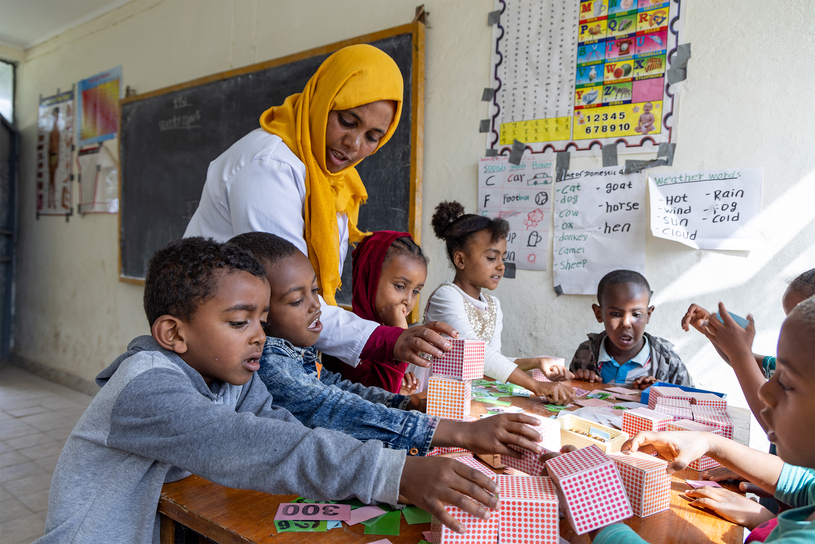World Teachers’ Day: We celebrate the hard work of teachers in making learning possible
Written by Lillian Viko
Oct 10, 2023

Research has shown that Learning through Play is a vital component of early childhood development, and it continues to be an effective and important approach in delivering learning throughout primary education. Learning through Play is key to developing children’s holistic skills; including being able to grasp complex (academic) concepts and develop critical thinking and problem-solving skills.
On World Teachers’ Day, we celebrate teachers and their essential role in fostering interactive learning methods in the classroom. For PlayMatters, learning through play is an active teaching and learning method in which children learn through guided, hands-on, meaningful, play-based interactions in safe and inclusive environments. Therefore, by incorporating play-based activities into lessons, teachers are key actors in creating an engaging and dynamic learning environment where pupils are motivated, engaged, interested, and fully participate in the learning process.
In our PlayMatters community, teachers work in low-resourced and humanitarian contexts where large classes and psychosocial challenges affect children’s learning. Our interactions with teachers in these environments revealed that their biggest challenges to integrating play were lack of time and large classes.
Yet, amidst such circumstances, we've seen teachers harness their creativity and time to make learning more engaging and bring out the transformative power of creating inclusive and safe spaces for all learners. For instance, in Kyaka II Refugee Settlement, in Western Uganda, Ms. Shukuru Mushesha, an early childhood education teacher, says she’s able to handle large classes through grouping and uses songs and locally-made learning materials to teach her classes with ease.
PlayMatters recognises the valuable role that teachers play and because of that the project is focusing resources on training and supporting teachers to strengthen education systems in Ethiopia, Uganda, and Tanzania to incorporate active learning through play practices into classrooms. We understand that there are different factors that affect teachers’ ability to deliver, creating gaps between national policies and relevant continuous professional development opportunities as well as a lack of enough teaching and learning materials. As such, PlayMatters project is providing holistic support for teachers so that they can thrive in their work.
Because of the challenging areas our teachers operate, we know that teachers' own wellbeing also affects their classroom practices. Therefore, we have integrated teacher wellbeing into our approaches to ensure teachers are supported to deliver in the challenging circumstances they work in, recognising that teachers must be well in order to teach well.
But we must also emphasise the role other education stakeholders have to play to support teachers and learning through play in schools. Parents and community members can support learning through play both at home and at school by engaging their children and endorsing quality teacher professional development that integrates teacher wellbeing. The government can create and uphold policies that support learning through play in schools and allocate resources for its implementation. Education ministries can promote the benefits of play-based learning to parents, teachers, and the wider communities.
In August, when stakeholders from the ministries of Education from Ethiopia, Uganda, and Tanzania met in Dar es Salaam, Tanzania, they unanimously agreed that learning through play is important in the classroom and expressed the need for innovative approaches to educating children, moving beyond traditional methods. PlayMatters is hopeful that these expressed commitments can be transformed into policies, and continued partnership to supporting teachers through training opportunities, material resources, and ongoing pedagogical and managerial support.
This World Teachers' Day, we recognise the transformative power of Learning through Play in early learning and primary education and the critical role of teachers. By embracing active learning methodologies, teachers can unlock the full potential of their learners, fostering holistic development, and preparing them for a brighter future. Let us support teachers to create joyful, and inclusive learning environments for all ECD and primary school-going children.

Lillian Viiko is the Senior Regional Policy & Advocacy Advisor for PlayMatters in Ethiopia, Uganda, and Tanzania
Lillian.Viko@Rescue.Org
The PlayMatters project is led by International Rescue Committee together with Plan International, WarChild Holland, The Behavioural Insights Team, and Innovations for Poverty Action in partnership with The LEGO Foundation, in Ethiopia, Uganda, and Tanzania.
This Opinion was first published in the Daily Monitor Newspaper, Uganda.